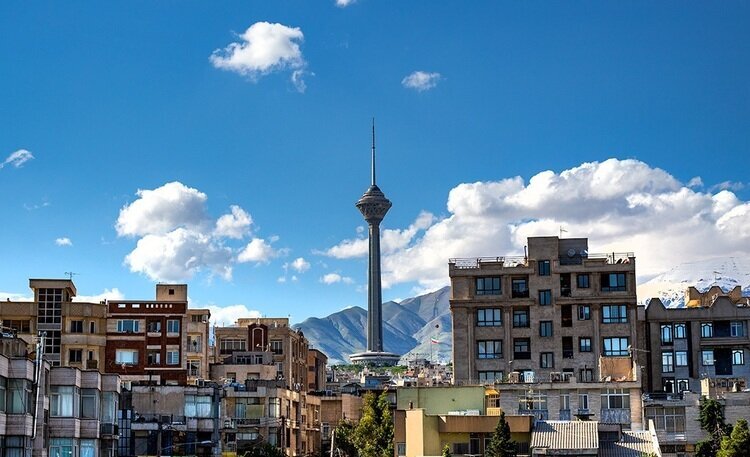Clean air for blue skies

TEHRAN – September 7 has been named World Clean Air Day, and this year's slogan is "Clean Air for Blue Skies", which emphasizes the health aspects of air pollution, especially considering the COVID-19 pandemic.
The 2021 theme for the International Day of Clean Air for blue skies focuses on prioritizing the need for healthy air for all while keeping the conversation broad enough to encompass other critical issues such as climate change, human and planetary health as well as the Sustainable Development Goals.
Air pollution is the single greatest environmental risk to human health and one of the main avoidable causes of death and disease globally, with an estimated 6.5 million premature deaths (2016) across the world attributed to indoor and outdoor air pollution. Particularly in developing countries, air pollution disproportionately affects women, children, and the elderly, especially in low-income populations as they are often exposed to high levels of ambient air pollution and indoor air pollution from cooking and heating with wood fuel and kerosene.
The world's population is now about 7.9 billion, which is projected to increase to over 9 billion by 2050, bringing the proportion of people living in cities from 50 percent to 70 percent; As a result, the Organization for Economic Co-operation and Development (OECD) predicts that air pollution deaths in cities will double by 2050 if proper policy changes are not made, and that air pollution will be the world's leading cause of environmental death. Because as the population of cities increases, so does the demand for fuel and transportation, and this exacerbates air pollution.
Air pollution is a global problem with far-reaching impacts owing to its transport over long distances. In the absence of aggressive intervention, the number of premature deaths resulting from ambient air pollution is estimated to be on track to increase by more than 50 percent by 2050.
Society bears a high cost of air pollution due to the negative impacts on the economy, work productivity, healthcare costs, and tourism, among others. Hence, the economic benefits of investing in air pollution control cannot be overestimated, and it must be understood that there is also an economic rationale to act and that cost-effective solutions exist to address air pollution.
Poor air quality is a challenge in the context of sustainable development for all countries, in particular in cities and urban areas in developing countries, with levels of air pollution that are higher than the limits set out in the World Health Organization air quality guidelines.
Some air pollutants, such as black carbon, methane, and ground-level ozone, are also short-lived climate pollutants and are responsible for a significant portion of air pollution-related deaths, as well as impacts on crops and hence food security, so their reduction has co-benefits for the climate.
When we talk about air pollution and its adverse effects on human health, the main factor to blame is particulate matter less than 2.5 microns, which are produced from carbon fuel, which is caused by burning coal, gasoline, and diesel, due to the cars and widespread fires, according to the World Health Organization, particulate matter is responsible for more than 85 percent of air pollution-related deaths, so the best way to reduce air pollution is to eliminate these factors.
A series of measures were then identified and recommended to reduce air pollution, including replacing gasoline and diesel vehicles with electric vehicles, eliminating uncontrolled diesel engines, preventing the burning of crops and farms, and moving to renewable energy.
Some countries have largely succeeded in reducing air pollution in their cities by applying these recommendations. The city of Shenzhen, China, for example, switched its public transportation using diesel fuel to a fleet of electric buses, which reduced carbon dioxide and PM 2.5 emissions by 48 percent.
Iran, along with other countries, tried to address air pollution, especially in metropolitan areas. Accordingly, the Clean Air Law was approved by the Majlis (Iranian parliament) in 2017.
Masoud Tajrishi, deputy head of the Department of Environment (DOE), has said that 50 percent of diesel production is standardized when sulfur is less than 50 PPM, and the other 50 percent is non-standard, the sulfur content is over 5,000 PPM, so less fuel production causes less air pollution.
Another cause of air pollution in a metropolis like Tehran is the high consumption of gas in houses, which causes them to use fuel oil or diesel for the power plants and industries. According to Tajrishi, each house consumes about 500-kilowatt hours of energy per square meter, while Europeans consume 200-kilowatt hours, and their policy is to decrease this to 50 kilowatts by 2025.
The clean air law clearly shows the ways out of this problem, but unfortunately, it is not implemented. The DOE opposes the burning of fuel oil and has repeatedly stated that he stated, but the implementation of the Clean Air Law is the duty of the Ministry of Interior.
The problem is that the implementation of the Clean Air Law is not the priority of the responsible bodies, he lamented.
FB/MG
Leave a Comment